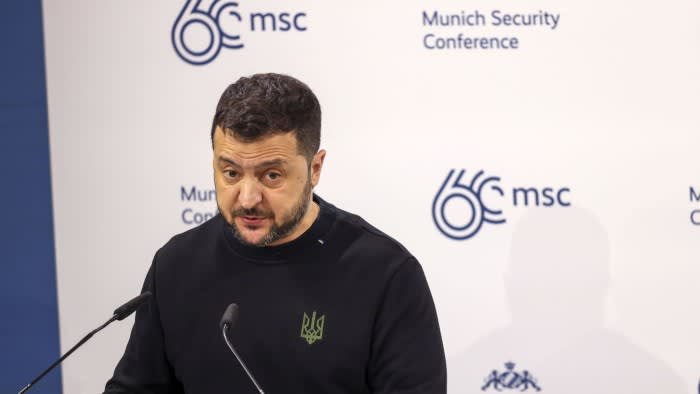Stay informed with free updates
Simply sign up to the War in Ukraine myFT Digest — delivered directly to your inbox.
Nato members are undermining their own security by holding back on critical weapon deliveries to Ukraine, Volodymyr Zelenskyy warned on Saturday, hours after his generals ordered a retreat from the eastern town of Avdiivka.
“Keeping Ukraine in the artificial deficit of weapons, particularly in deficit of artillery and long-range capabilities, allows Putin to adapt to the current intensity of the war,” the Ukrainian president told attendees of the Munich Security Conference.
“The self-weakening of democracy over time undermines our joint results.”
The three-day gathering of politicians, diplomats and military and intelligence chiefs was rocked by news of the death of Russian dissident Alexei Navalny on Friday. But the conference has also been marked by growing concern in Europe about America’s commitment to helping Ukraine, as Donald Trump-supporting Republicans continued to block more military aid to Kyiv.
Zelenskyy invited Trump to visit Ukraine to experience “real war” and said he would even take the Republican presidential frontrunner to the front lines to try to change his stance.
German chancellor Olaf Scholz urged European countries to do more to support Ukraine. The US had given Ukraine just over $20bn a year in military help, out of an economy of $28tn, he told the conference.
“A similar effort must be the minimum” that European countries undertake, he stressed. “Because at the end of the day we’re talking about the greatest threat to the security of our continent . . . If we are credible here, [Vladimir] Putin will understand that there can be no dictated peace at Russia’s behest.”
He added that a Russian victory in Ukraine would mean the “end of Ukraine as a free, independent, democratic state and the destruction of the European peace order”. It would also “encourage autocrats all over the world”.
Scholz, who was non-committal about whether his government would supply Taurus cruise missiles to Ukraine, reiterated that Nato did not want a conflict with Russia.
But, he added: “At the same time Putin and his generals in Russia must understand that we as the strongest military alliance in the world are capable of defending every square metre of alliance territory.”
Ursula von der Leyen, the EU Commission president, said: “We have to spend more, without any question. When I look at the [European] numbers I see a 20 per cent increase from last year to this year [in defence spending] but it is still not enough.”
Russia was “outmassing” Ukraine and playing “quick and dirty” on the battlefield, von der Leyen added. “They are throwing thousands and thousands of young men into battle . . . using weapons produced in North Korea and Iran.
“We have to outsmart Russia,” she said. She also said that the EU would open an office for defence innovation in Kyiv.
Accordingly to Zelenskyy, seven Russians have died for every Ukrainian loss of life in recent fighting.
While calling for Europe to do more, many European leaders also reserved particular criticism for US Republicans at the conference.
“Europe is on fire,” Tobias Ellwood, the former chair of the UK parliamentary defence committee told US Senator Pete Ricketts, who sits on the Senate foreign relations committee. “We are absolutely baffled at how this is being tied to the Mexico border issue.”
Republicans have blocked support for Kyiv in Congress because they say the Biden administration is not doing enough to control the flow of illegal immigrants over the US’s southern border.
Estonian prime minister Kaja Kallas said “6 per cent of our nation is Ukrainian refugees. In America that would be 20mn people.” She criticised what she said was a “what’s in it for us” attitude in Washington.
“History rhymes. We saw this already in the 1930s. American isolationism . . . not stopping the aggressor when we had the chance. And then seeing aggression spread all over the world.”

Emily Foster is a globe-trotting journalist based in the UK. Her articles offer readers a global perspective on international events, exploring complex geopolitical issues and providing a nuanced view of the world’s most pressing challenges.








